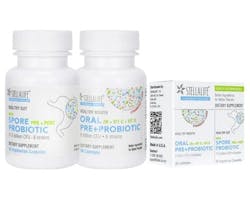Leaky gut is a condition where toxins, bacteria, and/or undigested food particles leak through a damaged part of the digestive track and enter the bloodstream, initiating an immune response that can interact with different systems of the body. Leaky gut, which results from intestinal permeability, can exacerbate irritable bowel syndrome (IBS), irritable bowel disease (IBD), and celiac disease (CD), which are common gastrointestinal disorders that affect around 10%–15% of the US population.1
Leaky gut can be associated with halitosis (bad breath) since many of the pathogenic bacteria that release volatile sulfur compounds and cause bad breath also play a part in the development of intestinal permeability. Leaky gut is multifactorial, with nutrition being one of the more important etiologies. This article will focus on how proper nutrition can mitigate leaky gut and in doing so, potentially help with bad breath.
How do I know if I have leaky gut?
25%–88% of people who have leaky gut can experience these typical symptoms:
- Halitosis and/or a change in breath
- Gastrointestinal issues such as abdominal pain, cramping, bloating, and alternating diarrhea or constipation
- Changes in stool composition, frequency, and a feeling of incomplete bowel movements
- Less obvious correlations include depression, anxiety, insomnia, skin conditions, joint pain, and high environmental reactivity.
What causes leaky gut?
Although there are many reasons why the gut lining (small intestinal lining) can become inflamed and the tight junctions of this lining become permeable, the following reasons are the top causes3:
- Diet including ultra-processed food, excessive alcohol intake, foods containing high pesticide concentrations, and high fermentable oligo di mono and polyol (FODMAP) foods
- Food intolerance/sensitivities, most notably dairy (lactose), gluten (gliadin), soy, eggs, wheat, nuts (peanuts and almonds), and corn
- Stress
- Infections and autoimmune diseases
- Medications such as antacids and antibiotics
How do I check for a leaky gut?
The gold standard for testing symptoms of leaky gut is:
- Serum zonulin test (a blood test that is considered the gold standard)
- Blood test measuring presence of antibodies such as zonulin, actin, and LPS (figure 1)
- Stool test measuring inflammatory markers
- Lactulose-mannitol ration urine test
Nutrition practices to improve leaky gut, bad breath
Foods such as garlic and onion can cause bad breath, but this problem is transient and usually goes away. Unfortunately, for people with leaky gut, these foods can be particularly damaging as they exacerbate both intestinal permeability (high FODMAP) and bad breath. FODMAP foods are foods that are easily fermented by gut bacteria that can cause inflammation and volatile sulfur compounds. These nutritional pathways are the best ways to fix leaky gut and improve bad breath:
- Probiotics4: One of the most effective methods of promoting healthy bacteria and lowering inflammation is through the use of probiotics that use a combination of Lactobacillus and Bifidobacterium species 1–10 billion CFU for two to three months (figure 2). StellaLife Oral lozenge probiotic and gut spore biotic is an excellent combination of these eubacteria that can improve halitosis caused by leaky gut (figure 3).
- Whole foods, not ultra-processed foods: Ultra-processed foods typically have additives such as emulsifiers, dyes, and chemicals that preserve shelf life but can damage the stomach lining and cause inflammation.
- Low FODMAP diet5: This may be particularly challenging as “healthy foods” can be high FODMAP, so people with leaky gut should avoid foods such as garlic, onions, asparagus, avocado, apples, watermelon, etc.
- Fermented foods: Foods such as kefir, live sauerkraut, low-sugar kombucha, tempeh, miso, and kimchi promote healthy bacteria that decrease inflammation.
- High polyphenol diet: The antioxidant properties of berries, foods high in omega-3, dark chocolate, spinach, and flaxseeds can lower inflammation.
- Prebiotics: Prebiotics including fiber (psyllium husk is a great choice)
- Spices: Peppermint, clove, and turmeric act as anti-inflammatories.
- Moderation of alcohol6: Two or three drinks per week do not have a deleterious effect on intestinal permeability. More than this amount can be damaging to the intestinal lining.
References
- Irritable bowel syndrome (IBS). American College of Gastroenterology. https://gi.org/topics/irritable-bowel-syndrome/
- Chelakkot C, Ghim J, Ryu SH. Mechanisms regulating intestinal barrier integrity and its pathological implications. Exp Mol Med. 2018;50(8):1-9. doi:10.1038/s12276-018-0126-x
- Camilleri M. Leaky gut: mechanisms, measurement and clinical implications in humans. Gut. 2019;68(8):1516-1526. doi:10.1136/gutjnl-2019-318427
- Zheng Y, Zhang Z, Tang P, et al. Probiotics fortify intestinal barrier function: a systematic review and meta-analysis of randomized trials. Front Immunol. 2023;14:1143548. doi:10.3389/fimmu.2023.1143548
- Camilleri M, Vella A. What to do about the leaky gut. Gut. 2022;71(2):424-435. doi:10.1136/gutjnl-2021-325428
- Bishehsari F, Magno E, Swanson G, et al. Alcohol and gut-derived inflammation. Alcohol Res. 2017;38(2):163-171.











